外研版(2019) 选择性必修第一册 Unit 2 Onwards and Upwards Developing ideas 课件(30张PPT)
文档属性
| 名称 | 外研版(2019) 选择性必修第一册 Unit 2 Onwards and Upwards Developing ideas 课件(30张PPT) | 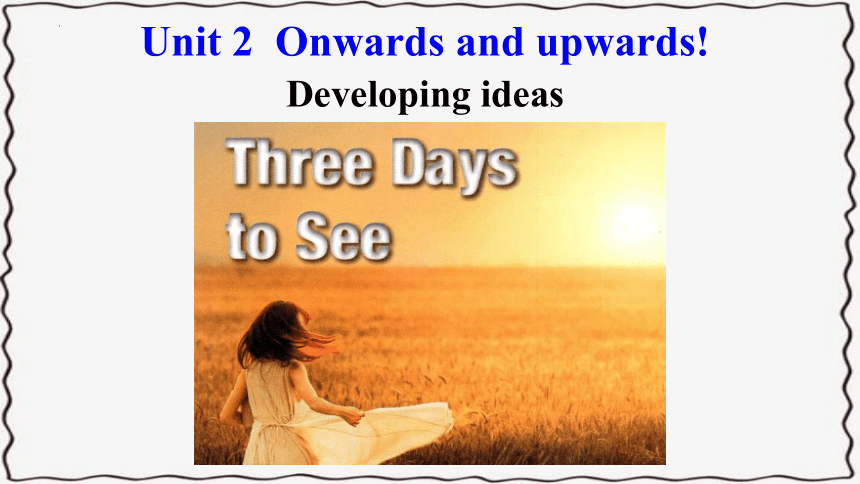 | |
| 格式 | zip | ||
| 文件大小 | 1.2MB | ||
| 资源类型 | 教案 | ||
| 版本资源 | 外研版(2019) | ||
| 科目 | 英语 | ||
| 更新时间 | 2022-11-28 21:13:07 | ||
图片预览

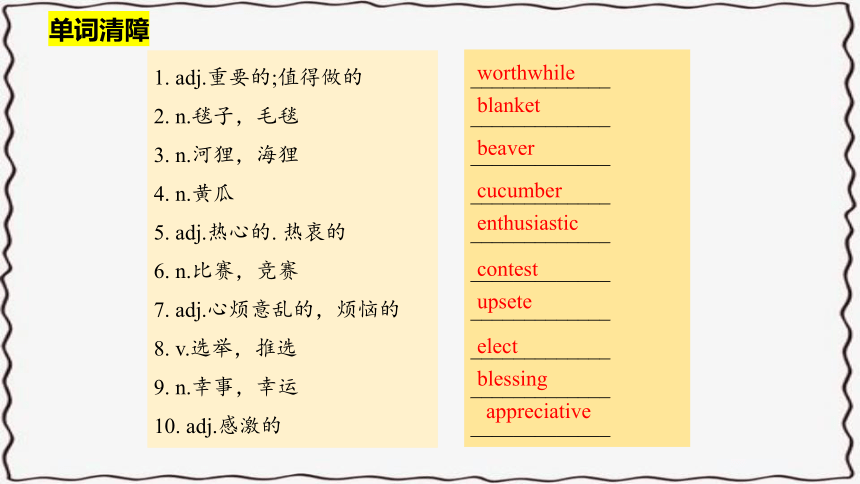
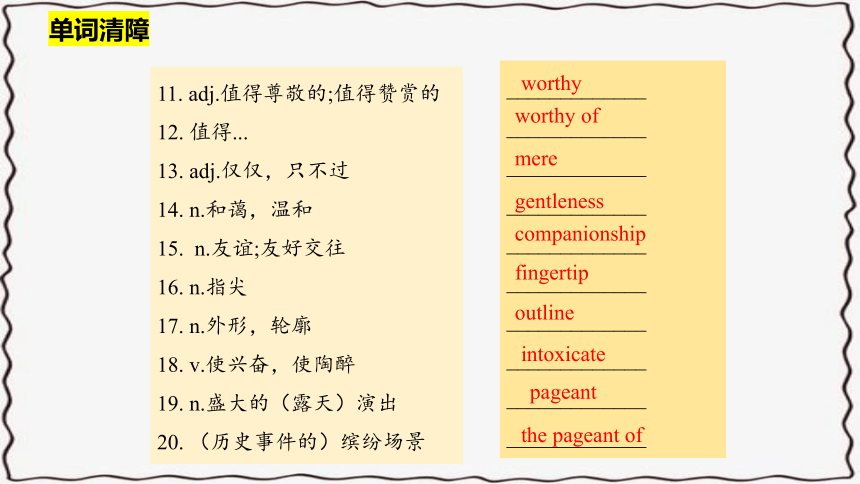
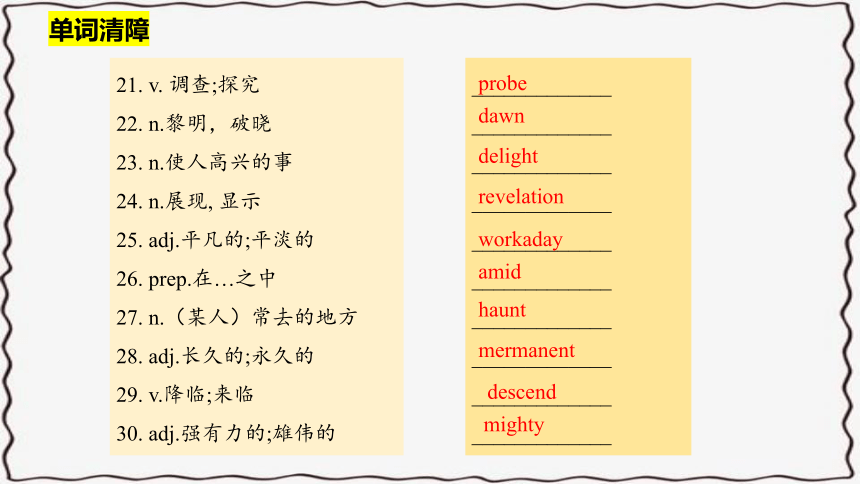
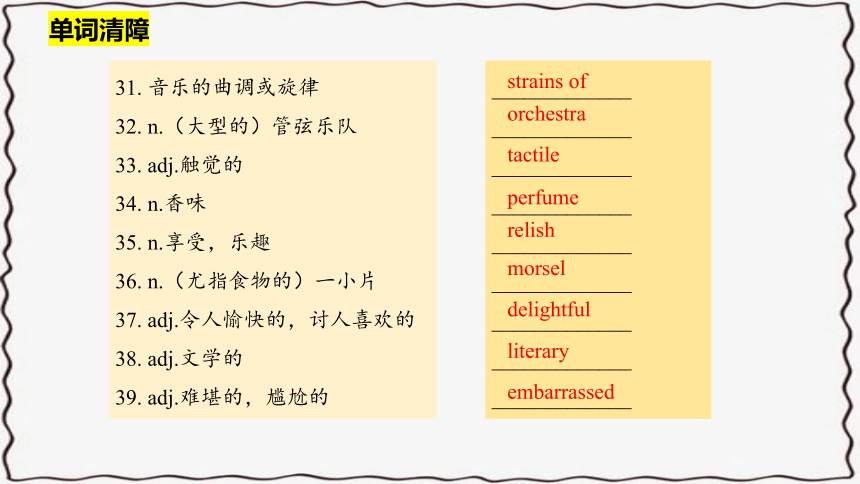
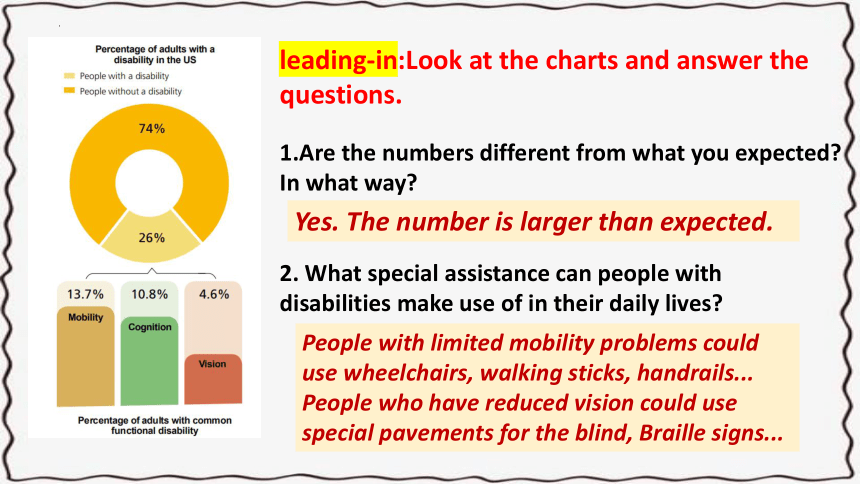
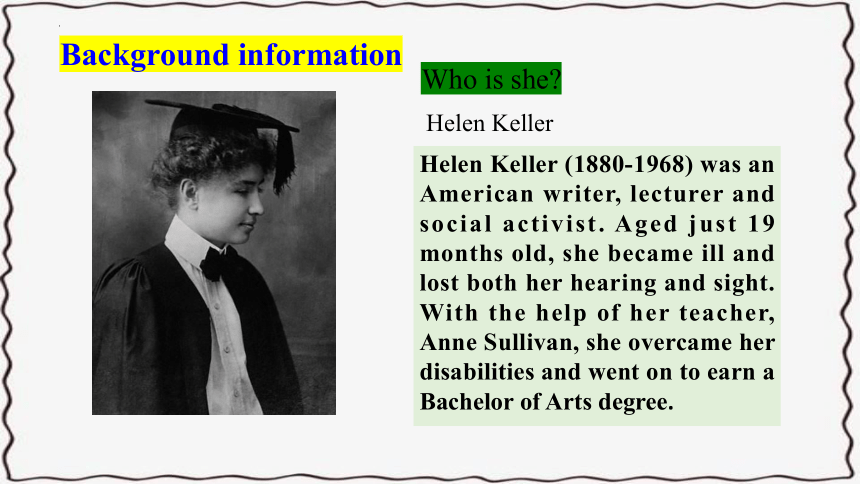
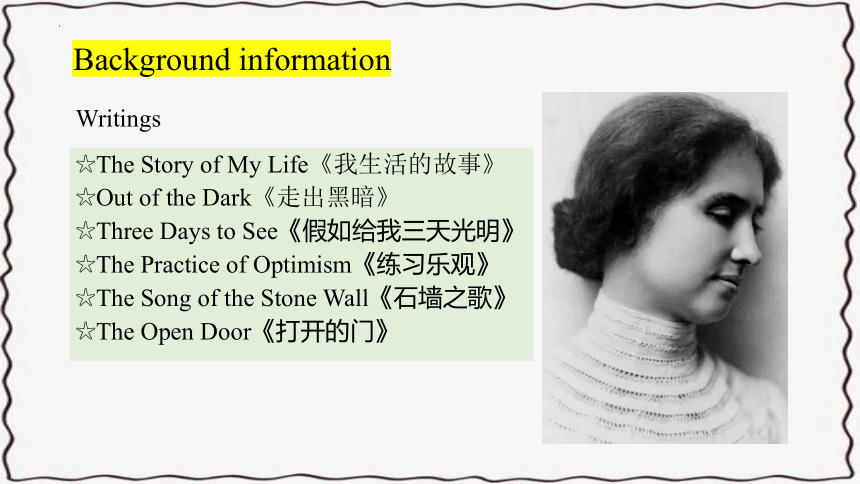
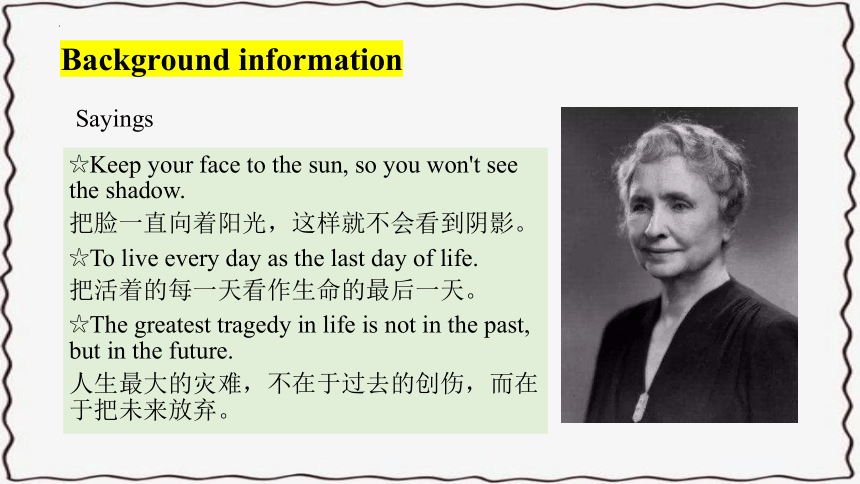
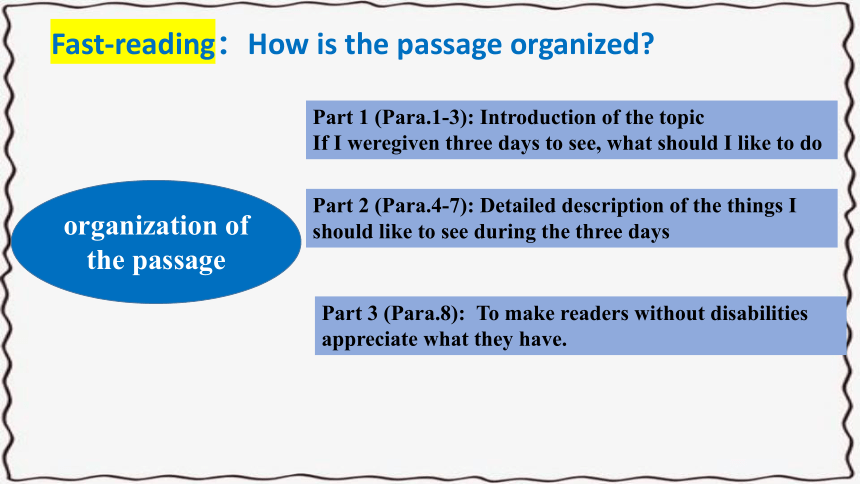

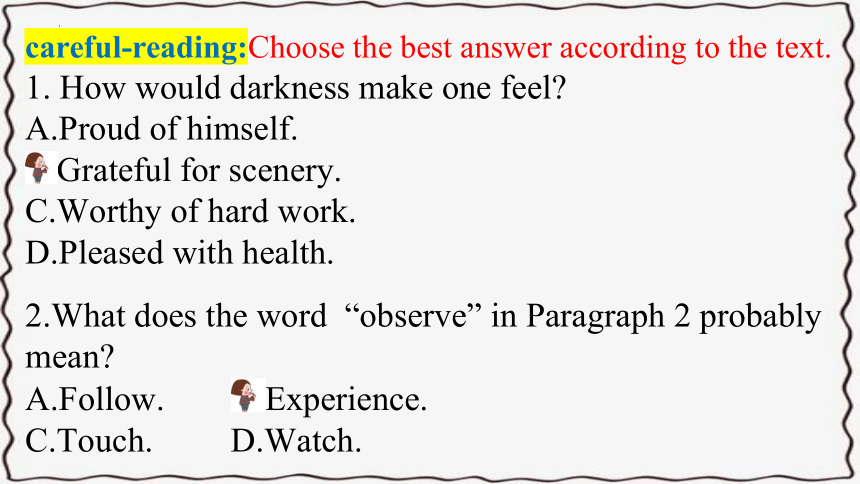
文档简介
(共30张PPT)
Unit 2 Onwards and upwards!
Developing ideas
1. adj.重要的;值得做的
2. n.毯子,毛毯
3. n.河狸,海狸
4. n.黄瓜
5. adj.热心的. 热衷的
6. n.比赛,竞赛
7. adj.心烦意乱的,烦恼的
8. v.选举,推选
9. n.幸事,幸运
10. adj.感激的
_____________
_____________
_____________
_____________
_____________
_____________
_____________
_____________
_____________
_____________
worthwhile
blanket
beaver
cucumber
enthusiastic
contest
upsete
blessing
elect
appreciative
单词清障
11. adj.值得尊敬的;值得赞赏的
12. 值得...
13. adj.仅仅,只不过
14. n.和蔼,温和
15. n.友谊;友好交往
16. n.指尖
17. n.外形,轮廓
18. v.使兴奋,使陶醉
19. n.盛大的(露天)演出
20. (历史事件的)缤纷场景
_____________
_____________
_____________
_____________
_____________
_____________
_____________
_____________
_____________
_____________
worthy
worthy of
mere
gentleness
companionship
fingertip
outline
intoxicate
pageant
the pageant of
单词清障
_____________
_____________
_____________
_____________
_____________
_____________
_____________
_____________
_____________
_____________
21. v. 调查;探究
22. n.黎明,破晓
23. n.使人高兴的事
24. n.展现, 显示
25. adj.平凡的;平淡的
26. prep.在…之中
27. n.(某人)常去的地方
28. adj.长久的;永久的
29. v.降临;来临
30. adj.强有力的;雄伟的
probe
dawn
delight
revelation
workaday
amid
haunt
mermanent
descend
mighty
单词清障
31. 音乐的曲调或旋律
32. n.(大型的)管弦乐队
33. adj.触觉的
34. n.香味
35. n.享受,乐趣
36. n.(尤指食物的)一小片
37. adj.令人愉快的,讨人喜欢的
38. adj.文学的
39. adj.难堪的,尴尬的
_____________
_____________
_____________
_____________
_____________
_____________
_____________
_____________
_____________
strains of
orchestra
tactile
perfume
relish
morsel
delightful
literary
embarrassed
单词清障
leading-in:Look at the charts and answer the questions.
1.Are the numbers different from what you expected In what way
Yes. The number is larger than expected.
2. What special assistance can people with disabilities make use of in their daily lives
People with limited mobility problems could use wheelchairs, walking sticks, handrails...
People who have reduced vision could use special pavements for the blind, Braille signs...
Yes. The number is larger than expected.
People with limited mobility problems could use wheelchairs, walking sticks, handrails...
People who have reduced vision could use
special pavements for the blind, Braille signs...
Background information
Helen Keller
Helen Keller (1880-1968) was an American writer, lecturer and social activist. Aged just 19 months old, she became ill and lost both her hearing and sight. With the help of her teacher, Anne Sullivan, she overcame her disabilities and went on to earn a Bachelor of Arts degree.
Who is she
Background information
Writings
☆The Story of My Life《我生活的故事》
☆Out of the Dark《走出黑暗》
☆Three Days to See《假如给我三天光明》
☆The Practice of Optimism《练习乐观》
☆The Song of the Stone Wall《石墙之歌》
☆The Open Door《打开的门》
Background information
Sayings
☆Keep your face to the sun, so you won't see the shadow.
把脸一直向着阳光,这样就不会看到阴影。
☆To live every day as the last day of life.
把活着的每一天看作生命的最后一天。
☆The greatest tragedy in life is not in the past, but in the future.
人生最大的灾难,不在于过去的创伤,而在于把未来放弃。
organization of the passage
Part 1 (Para.1-3): Introduction of the topic
If I weregiven three days to see, what should I like to do
Part 2 (Para.4-7): Detailed description of the things I should like to see during the three days
Part 3 (Para.8): To make readers without disabilities appreciate what they have.
Fast-reading:How is the passage organized
Fast-reading:Match the main idea with each paragraph
Para.1
Para.2
Para.3
Para.4
Para.5
Para.6
Para.7
Para.8
A.What should I like to see if given the use of my eyes
for three days
B.What I'd like to do on the first day.
C.My feeling when the time is up.
D.A survey:a normarl person found nothing
particular after a walk.
E.What I'd like to do on the third day.
F.My plan on the second day.
G.We should be appreciative of our sight and hearing.
H.I who am blind can give one hint to those who see.
careful-reading:Choose the best answer according to the text.
1. How would darkness make one feel
A.Proud of himself.
B.Grateful for scenery.
C.Worthy of hard work.
D.Pleased with health.
2.What does the word “observe” in Paragraph 2 probably mean
A.Follow. B.Experience.
C.Touch. D.Watch.
3.Why would the author not be able to sleep on the first
night
A.Because she would be disappointed.
B.Because she would be tired.
C.Because she would be excited.
D.Because she would be alone.
4.There are many“as if” in the sentences in the last
paragraph. What figure of speech is it
A.Parallelism. B.Metaphor.
C.Personification. D.Rhetorical question.
careful-reading:Read the passage and find out what the author would do if she could see.
The first day
The second day
The third day
She would greet the dawn, discover new delights and beauty, spend in the workaday world.
She would go to the museum and see the pageant of man’s progress, probe into the soul of man through his art, see a movie or a drama.
She would want to see the people who made her life worth living through the eyes, see the books read to her, take a walk in the woods and enjoy the beauty of nature.
Careful reading:Choose the author’s purpose in writing the passage and give your reasons.
1. To help readers understand what it is like to be blind.
2. To make readers without disabilities appreciate what they have.
3. To persuade readers to care about the blind.
Language points——重点词汇
1. I have often thought it would be a blessing if each human being were stricken blind and deaf for a few days at some time during his early adult life.
stricken adj.意为“受灾的;患病的;受困扰的;受苦的”。
-stricken 作为后缀,与某些名词连用,表示“受……侵袭的”。
e.g. flood-stricken area “遭受洪灾的地区”
考点提炼:虚拟条件句
对点训练:
1.If he had not been addicted to the cellphone when walking, he wouldn't _________ (be) hit by a car.
2.If I had the chance, I _________________________(start) a business that would benefit my classmates at my university.
3.If I _______(be) you, I would pay more attention to English idioms and phrases.
虚拟语气 if 从句 主句
与过去事实相反 had done would/could/should/might+have done
与现在事实相反 did (be动词用were) would/could/should/might + do
与将来事实相反 did (be动词用were) /should do/ were to do would/could/should/might + do
have been
would/could/should/might start
were
2.Recently,I asked a friend who had just returned from a long walk in the woods what she had observed.
observe表示“观察到;注意到”,此外,它还有“遵守;庆祝”等含义。
It is everybody’s duty to observe them keep our society in order.
监督他们维持社会秩序是每个人的责任。
【词汇拓展】
observe sb do sth看到/注意到某人做某事(全过程)
observe sb doing sth看到/注意到某人正在做某事
observe sb done看到/注意到到某人被……
observation n.观察;观察力
observer n.观察者,观察员
observatory n.天文台;气象台
under observation受监视
When I passed his house,I observed him playing in his yard.
当我经过他家时,我注意到他正在院子里玩耍。
The police have had him under observation for several weeks.
警方已监视他数周了。
3. How was it possible, I asked myself, to walk for an hour through the woods and see nothing worthy of notes
It is (im)possible for sb. to do sth.
e.g. It is impossible for people to live without air.
be worthy of… 意为“值得……”
e.g. The city is so beautiful that it is worthy of a second visit.= The city is so beautiful that it is worthy of being visited a second time.
3. If I can get so much pleasure from touch, how much more beauty must be revealed by sight
本句表达了作者想要亲自用眼睛观察世界的强烈感情。revealed的思是“揭示;揭露;透露。”
e.g. I should be glad to help you if you reveal your thoughts to me.
4.On the first day,I should want to see the people whose kindness and gentleness and companionship have made my life worth living.
【句式剖析】该句子中whose kindness and gentleness and companionship have made my life worth living为whose引导的定语从句,修饰先行词the people。
I’m just not used to being with people whose minds work as fast as his does.
我只是不习惯和他这样思维敏捷的人在一起。
【句式拓展】
关系代词whose在定语从句中作定语,既可以指人也可以指物。其后接名词,与先行词构成从属关系。
This is the scientist whose name is known all over the country.这就是那位闻名全国的科学家。
Nobody wants the house whose roof has fallen down.
没有人想要这个屋顶已坍塌的房子。
【名师点睛】当先行词是物时,作定语的引导词可用“whose+n.”“the+n.+of which”或“of which the+n.”。
This is the building whose windows were all painted green.
= This is the building,the windows of which were all painted green.
=This is the building,of which the windows were all painted green.
5.The following morning,I should again greet the dawn,anxious to discover new delights,new revelations of beauty.
delight 为可数名词,表示“使人高兴的事”;delight作不可数名词,表示“快乐;高兴;喜悦”;它还可作动词,表示“ (使)高兴;(使)欣喜”。
Her first delight was going to the Tower of London.
她想最先参观的地方是伦敦塔。
It delights me to have made your acquaintance.
我很高兴与你相识。
【词汇拓展】
take (great)delight in以……为乐
with delight高兴地;愉快地
to one’s delight 使某人高兴的是
delight sb with sth用某物使某人高兴
delight in (doing)sth以(做)某事为乐
delighted adj.高兴的;快乐的
be delighted at/by为某事而高兴
be delighted to do/in doing sth为做某事而高兴
delightful adj.令人高兴的
6. Only when darkness had again descended upon me should I realize how much I had left unseen.
本句是一个倒装句,强调时间状语。当副词only置于句首修饰状语时,主句通常用倒装结构。
e.g. Only in this way can we work out the problem.
descend意思是“(黑暗、寂静等突然)降临;(感情等突然)袭来,常见搭配为descend on/upon/over。
e.g. Total silence descended on the room.
考点提炼:
“only+状语(状语从句) ” 位于句首引起的部分倒装
“only+状语(状语从句) ” 位于句首时,句子(主句)要用部分倒装结构,即把(主)句中的助动词、情态动词或be动词提到(主句)主语前。Only 强调状语。
注意:only 修饰主语时,不用倒装结构。
对点训练:
1.The teacher realized that she had left the textbook at home only when she walked into the classroom. (变为only开头的倒装句)
2.到那时我才意识到我所犯的错误。
Only when the teacher walked into the classroom did she realize that she had left the textbook at home.
Only then did I realize the mistakes I had made.
Helen has often thought it would be a 1______________(bless) if each human being 2_______(be) stricken blind and deaf for a few days 3______ some time during his early adult life. 4______________(dark) would make him more 5_______________(appreciate) of sight; silence would teach him the joys of sound. Recently she asked a friend 6_________ had just returned from a long walk in the woods what she had observed. “ Nothing in particular,” her friend replied. A little disappointed, she asked herself, “ How was 7________ possible to walk for an hour through the woods and see nothing 8___________(worth) of note I who cannot see find hundreds of things to interest me through mere touch. How much more beauty must 9_____________(reveal) by sight ” Eventually she bit her tongue before all the words rushed out. She is sure that sight must be the most 10________________(delight).
直击高考
blessing
were
at
Darkness
appreciative
who
it
worthy
be revealed
delightful
Important phrases:
be stricken blind and deaf
appreciative of
now and then
in particular
be worthy of note
probe into
go about
close in on
descend upon/on
give one hint to
as if
apply... to
突然失明失聪
感谢…… = appreciate v.
偶尔,有时,不时
尤其,特别
值得注意
探究,探索
从事;着手做...;闲逛
包围;逼近;逐渐接近
突然降临;突然袭击
给某人一个提示
好像;仿佛 =as though
适用于;应用于;涂抹
Thanks for attention
Unit 2 Onwards and upwards!
Developing ideas
1. adj.重要的;值得做的
2. n.毯子,毛毯
3. n.河狸,海狸
4. n.黄瓜
5. adj.热心的. 热衷的
6. n.比赛,竞赛
7. adj.心烦意乱的,烦恼的
8. v.选举,推选
9. n.幸事,幸运
10. adj.感激的
_____________
_____________
_____________
_____________
_____________
_____________
_____________
_____________
_____________
_____________
worthwhile
blanket
beaver
cucumber
enthusiastic
contest
upsete
blessing
elect
appreciative
单词清障
11. adj.值得尊敬的;值得赞赏的
12. 值得...
13. adj.仅仅,只不过
14. n.和蔼,温和
15. n.友谊;友好交往
16. n.指尖
17. n.外形,轮廓
18. v.使兴奋,使陶醉
19. n.盛大的(露天)演出
20. (历史事件的)缤纷场景
_____________
_____________
_____________
_____________
_____________
_____________
_____________
_____________
_____________
_____________
worthy
worthy of
mere
gentleness
companionship
fingertip
outline
intoxicate
pageant
the pageant of
单词清障
_____________
_____________
_____________
_____________
_____________
_____________
_____________
_____________
_____________
_____________
21. v. 调查;探究
22. n.黎明,破晓
23. n.使人高兴的事
24. n.展现, 显示
25. adj.平凡的;平淡的
26. prep.在…之中
27. n.(某人)常去的地方
28. adj.长久的;永久的
29. v.降临;来临
30. adj.强有力的;雄伟的
probe
dawn
delight
revelation
workaday
amid
haunt
mermanent
descend
mighty
单词清障
31. 音乐的曲调或旋律
32. n.(大型的)管弦乐队
33. adj.触觉的
34. n.香味
35. n.享受,乐趣
36. n.(尤指食物的)一小片
37. adj.令人愉快的,讨人喜欢的
38. adj.文学的
39. adj.难堪的,尴尬的
_____________
_____________
_____________
_____________
_____________
_____________
_____________
_____________
_____________
strains of
orchestra
tactile
perfume
relish
morsel
delightful
literary
embarrassed
单词清障
leading-in:Look at the charts and answer the questions.
1.Are the numbers different from what you expected In what way
Yes. The number is larger than expected.
2. What special assistance can people with disabilities make use of in their daily lives
People with limited mobility problems could use wheelchairs, walking sticks, handrails...
People who have reduced vision could use special pavements for the blind, Braille signs...
Yes. The number is larger than expected.
People with limited mobility problems could use wheelchairs, walking sticks, handrails...
People who have reduced vision could use
special pavements for the blind, Braille signs...
Background information
Helen Keller
Helen Keller (1880-1968) was an American writer, lecturer and social activist. Aged just 19 months old, she became ill and lost both her hearing and sight. With the help of her teacher, Anne Sullivan, she overcame her disabilities and went on to earn a Bachelor of Arts degree.
Who is she
Background information
Writings
☆The Story of My Life《我生活的故事》
☆Out of the Dark《走出黑暗》
☆Three Days to See《假如给我三天光明》
☆The Practice of Optimism《练习乐观》
☆The Song of the Stone Wall《石墙之歌》
☆The Open Door《打开的门》
Background information
Sayings
☆Keep your face to the sun, so you won't see the shadow.
把脸一直向着阳光,这样就不会看到阴影。
☆To live every day as the last day of life.
把活着的每一天看作生命的最后一天。
☆The greatest tragedy in life is not in the past, but in the future.
人生最大的灾难,不在于过去的创伤,而在于把未来放弃。
organization of the passage
Part 1 (Para.1-3): Introduction of the topic
If I weregiven three days to see, what should I like to do
Part 2 (Para.4-7): Detailed description of the things I should like to see during the three days
Part 3 (Para.8): To make readers without disabilities appreciate what they have.
Fast-reading:How is the passage organized
Fast-reading:Match the main idea with each paragraph
Para.1
Para.2
Para.3
Para.4
Para.5
Para.6
Para.7
Para.8
A.What should I like to see if given the use of my eyes
for three days
B.What I'd like to do on the first day.
C.My feeling when the time is up.
D.A survey:a normarl person found nothing
particular after a walk.
E.What I'd like to do on the third day.
F.My plan on the second day.
G.We should be appreciative of our sight and hearing.
H.I who am blind can give one hint to those who see.
careful-reading:Choose the best answer according to the text.
1. How would darkness make one feel
A.Proud of himself.
B.Grateful for scenery.
C.Worthy of hard work.
D.Pleased with health.
2.What does the word “observe” in Paragraph 2 probably mean
A.Follow. B.Experience.
C.Touch. D.Watch.
3.Why would the author not be able to sleep on the first
night
A.Because she would be disappointed.
B.Because she would be tired.
C.Because she would be excited.
D.Because she would be alone.
4.There are many“as if” in the sentences in the last
paragraph. What figure of speech is it
A.Parallelism. B.Metaphor.
C.Personification. D.Rhetorical question.
careful-reading:Read the passage and find out what the author would do if she could see.
The first day
The second day
The third day
She would greet the dawn, discover new delights and beauty, spend in the workaday world.
She would go to the museum and see the pageant of man’s progress, probe into the soul of man through his art, see a movie or a drama.
She would want to see the people who made her life worth living through the eyes, see the books read to her, take a walk in the woods and enjoy the beauty of nature.
Careful reading:Choose the author’s purpose in writing the passage and give your reasons.
1. To help readers understand what it is like to be blind.
2. To make readers without disabilities appreciate what they have.
3. To persuade readers to care about the blind.
Language points——重点词汇
1. I have often thought it would be a blessing if each human being were stricken blind and deaf for a few days at some time during his early adult life.
stricken adj.意为“受灾的;患病的;受困扰的;受苦的”。
-stricken 作为后缀,与某些名词连用,表示“受……侵袭的”。
e.g. flood-stricken area “遭受洪灾的地区”
考点提炼:虚拟条件句
对点训练:
1.If he had not been addicted to the cellphone when walking, he wouldn't _________ (be) hit by a car.
2.If I had the chance, I _________________________(start) a business that would benefit my classmates at my university.
3.If I _______(be) you, I would pay more attention to English idioms and phrases.
虚拟语气 if 从句 主句
与过去事实相反 had done would/could/should/might+have done
与现在事实相反 did (be动词用were) would/could/should/might + do
与将来事实相反 did (be动词用were) /should do/ were to do would/could/should/might + do
have been
would/could/should/might start
were
2.Recently,I asked a friend who had just returned from a long walk in the woods what she had observed.
observe表示“观察到;注意到”,此外,它还有“遵守;庆祝”等含义。
It is everybody’s duty to observe them keep our society in order.
监督他们维持社会秩序是每个人的责任。
【词汇拓展】
observe sb do sth看到/注意到某人做某事(全过程)
observe sb doing sth看到/注意到某人正在做某事
observe sb done看到/注意到到某人被……
observation n.观察;观察力
observer n.观察者,观察员
observatory n.天文台;气象台
under observation受监视
When I passed his house,I observed him playing in his yard.
当我经过他家时,我注意到他正在院子里玩耍。
The police have had him under observation for several weeks.
警方已监视他数周了。
3. How was it possible, I asked myself, to walk for an hour through the woods and see nothing worthy of notes
It is (im)possible for sb. to do sth.
e.g. It is impossible for people to live without air.
be worthy of… 意为“值得……”
e.g. The city is so beautiful that it is worthy of a second visit.= The city is so beautiful that it is worthy of being visited a second time.
3. If I can get so much pleasure from touch, how much more beauty must be revealed by sight
本句表达了作者想要亲自用眼睛观察世界的强烈感情。revealed的思是“揭示;揭露;透露。”
e.g. I should be glad to help you if you reveal your thoughts to me.
4.On the first day,I should want to see the people whose kindness and gentleness and companionship have made my life worth living.
【句式剖析】该句子中whose kindness and gentleness and companionship have made my life worth living为whose引导的定语从句,修饰先行词the people。
I’m just not used to being with people whose minds work as fast as his does.
我只是不习惯和他这样思维敏捷的人在一起。
【句式拓展】
关系代词whose在定语从句中作定语,既可以指人也可以指物。其后接名词,与先行词构成从属关系。
This is the scientist whose name is known all over the country.这就是那位闻名全国的科学家。
Nobody wants the house whose roof has fallen down.
没有人想要这个屋顶已坍塌的房子。
【名师点睛】当先行词是物时,作定语的引导词可用“whose+n.”“the+n.+of which”或“of which the+n.”。
This is the building whose windows were all painted green.
= This is the building,the windows of which were all painted green.
=This is the building,of which the windows were all painted green.
5.The following morning,I should again greet the dawn,anxious to discover new delights,new revelations of beauty.
delight 为可数名词,表示“使人高兴的事”;delight作不可数名词,表示“快乐;高兴;喜悦”;它还可作动词,表示“ (使)高兴;(使)欣喜”。
Her first delight was going to the Tower of London.
她想最先参观的地方是伦敦塔。
It delights me to have made your acquaintance.
我很高兴与你相识。
【词汇拓展】
take (great)delight in以……为乐
with delight高兴地;愉快地
to one’s delight 使某人高兴的是
delight sb with sth用某物使某人高兴
delight in (doing)sth以(做)某事为乐
delighted adj.高兴的;快乐的
be delighted at/by为某事而高兴
be delighted to do/in doing sth为做某事而高兴
delightful adj.令人高兴的
6. Only when darkness had again descended upon me should I realize how much I had left unseen.
本句是一个倒装句,强调时间状语。当副词only置于句首修饰状语时,主句通常用倒装结构。
e.g. Only in this way can we work out the problem.
descend意思是“(黑暗、寂静等突然)降临;(感情等突然)袭来,常见搭配为descend on/upon/over。
e.g. Total silence descended on the room.
考点提炼:
“only+状语(状语从句) ” 位于句首引起的部分倒装
“only+状语(状语从句) ” 位于句首时,句子(主句)要用部分倒装结构,即把(主)句中的助动词、情态动词或be动词提到(主句)主语前。Only 强调状语。
注意:only 修饰主语时,不用倒装结构。
对点训练:
1.The teacher realized that she had left the textbook at home only when she walked into the classroom. (变为only开头的倒装句)
2.到那时我才意识到我所犯的错误。
Only when the teacher walked into the classroom did she realize that she had left the textbook at home.
Only then did I realize the mistakes I had made.
Helen has often thought it would be a 1______________(bless) if each human being 2_______(be) stricken blind and deaf for a few days 3______ some time during his early adult life. 4______________(dark) would make him more 5_______________(appreciate) of sight; silence would teach him the joys of sound. Recently she asked a friend 6_________ had just returned from a long walk in the woods what she had observed. “ Nothing in particular,” her friend replied. A little disappointed, she asked herself, “ How was 7________ possible to walk for an hour through the woods and see nothing 8___________(worth) of note I who cannot see find hundreds of things to interest me through mere touch. How much more beauty must 9_____________(reveal) by sight ” Eventually she bit her tongue before all the words rushed out. She is sure that sight must be the most 10________________(delight).
直击高考
blessing
were
at
Darkness
appreciative
who
it
worthy
be revealed
delightful
Important phrases:
be stricken blind and deaf
appreciative of
now and then
in particular
be worthy of note
probe into
go about
close in on
descend upon/on
give one hint to
as if
apply... to
突然失明失聪
感谢…… = appreciate v.
偶尔,有时,不时
尤其,特别
值得注意
探究,探索
从事;着手做...;闲逛
包围;逼近;逐渐接近
突然降临;突然袭击
给某人一个提示
好像;仿佛 =as though
适用于;应用于;涂抹
Thanks for attention
